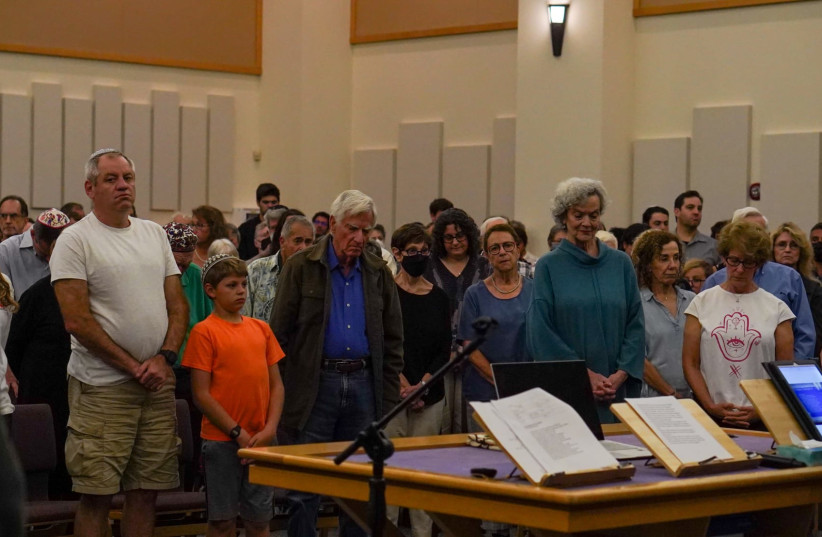In the span of three turbulent weeks marked by the Swords of Iron war against Hamas, the sense of solidarity that American Reform Jews have traditionally held for Israel has dwindled, plunging from 72% during the first week of the war to a mere 59% the third week.
This dip, highlighted in a joint survey by the Jewish People Policy Institute and the World Zionist Organization, highlights the shifting sentiments within a key Jewish demographic in the US. Once steadfast allies, some Reform Jews are grappling with complex feelings of disconnection from the nation that has been central to Jewish identity and unity.
According to the survey, the proportion of Reform Jews who said the carnage of October 7 will make them feel closer to Israel dropped from 72% in the first week of the war to 59% in the third week, with the main change being a significant rise in the percentage of those who believe that the events “will not change” their relationship with Israel.
The estrangement felt by many is strikingly significant given the historical underpinnings of their connection with Israel. As a religious stream that places high value on social justice and humanitarian principles, the actions and policies of Israel during times of conflict are subject to intense scrutiny and often moral dissonance.
The findings not only reflect an immediate reaction to the ongoing strife but also suggest a deeper, more long-term reevaluation of the alliance between American liberal Jewish values and Israeli statecraft.

The divide within the American Jewish community appears most palpable in intimate settings, where discussions about the war are prevalent among friends and family, yet markedly absent in professional environments. This dichotomy points to the deeply personal and often contentious nature of the subject, and perhaps to a hesitancy to broach a topic that may elicit a multitude of divisive opinions.
Differences in political leanings also illuminate the nuances within the community’s response to Israel’s actions. While support remains stronger among centrist and conservative Jews, the liberal sectors, particularly the Reform, show a clear trend toward disengagement. These patterns underscore the intersectionality of political ideology and religious identity in shaping the American Jewish discourse on Israel.
Reform Rabbis chime in
In June, Rabbi Ammiel Hirsch, one of the more conservative-leaning rabbis in the Reform movement told The Jerusalem Post he feels that “we are losing the soul of the movement. But the process of distancing from Israel was gathering strength for many years before this government came into existence.”
This was one of the many topics at the center of a conference he hosted with Reform rabbis, discussing inner challenges that the movement has been dealing with for a while. Hirsch stated then that critiquing decision-makers is a sign of health and vitality in the Jewish community. However, turning “against Israel, to join our ideological opponents and political enemies in castigating Zionism, is a sign of Jewish illness,” he conditioned.
He concluded by saying that “Judaism absent Jewish peoplehood is not Judaism; it is something else. At no time in the history of our people was separation from the Land of Israel considered permanent.” Hirsch added that it is “inconceivable” to imagine North American Reform Judaism without what has been built in Israel over the past 50 years.
That said, Rabbi Rick Jacobs, the president of the Union for Reform Judaism, told ynet that he would like to “express in very clear terms” that “we may disagree about politics and policies, but we stand with the people and the State of Israel in this critical moment and we’re working intensely in North America to show support and to build even more connection to Israel.”
Rabbi Meir Azari, one of Israel’s veteran Reform rabbis, understands this trend, but views it a bit differently: “The Reform leadership in North America has significantly changed its attitude towards Israel for the better, recognizing the extent of the division and disaster,” he said. “Political disputes over the movement’s status and other issues have been set aside. There is widespread affection within the leadership. Among the adult community members, the admiration for Israel is boundless.”
Yet the reason, according to Azari, for the decline in support, is due to the fact that the younger generation consumes its media online or from social media skewed against Israel. “For the youth, Israel’s image is marred by the atrocities in Gaza. During the first week, the focus was on the atrocities in Israel. This represents a younger generation that struggles to identify balanced media coverage. This leads to the issue of the younger generation’s inability to communicate effectively with their peers.”
Azari’s point is clear: Both the rabbinic and political leadership in the US are with Israel, but those who consume their news from non-journalistic sources, see Israel as the demon.
According to a Pew survey, in 2020, 54% of US Jews identified with the Reform (37%) and Conservative (17%) movements, echoing the 2013 figures, while Orthodox Jews accounted for 9% .Other branches such as Reconstructionist and Humanistic Judaism composed 4%, and those unaffiliated with any branch made up 32%.
Orthodox Jews remained traditionally observant with strong ties to Israel, a conservative political leaning, and younger demographics. In contrast, Conservative and Reform Jews were generally less observant, older, culturally engaged, and somewhat attached to Israel.
The current trajectory of American Reform Jewry’s relationship with Israel, as underscored by the JPPI’s analysis, is at a crossroads. It is one shaped by the conflict’s evolution and the internal discourse it has provoked. The challenge for community leaders and institutions is to facilitate a dialogue that respects the diversity of opinions while retaining a meaningful connection to Israel.
As American Reform Jews continue to reconcile their liberal values with their historical bonds to Israel, their collective stance is likely to reflect a broader ideological exploration – one that could redefine the contours of Jewish solidarity in the 21st century.
